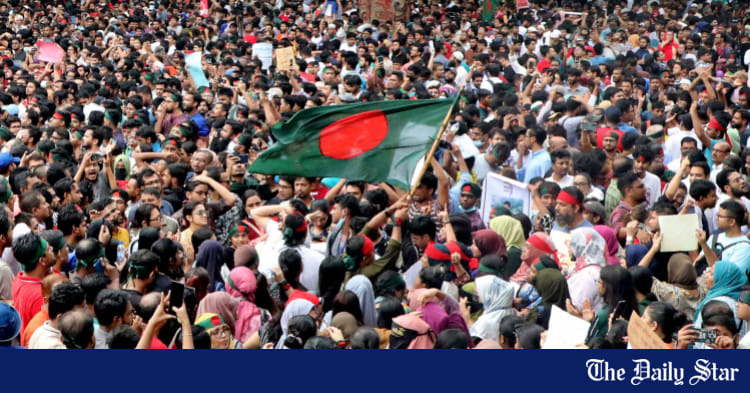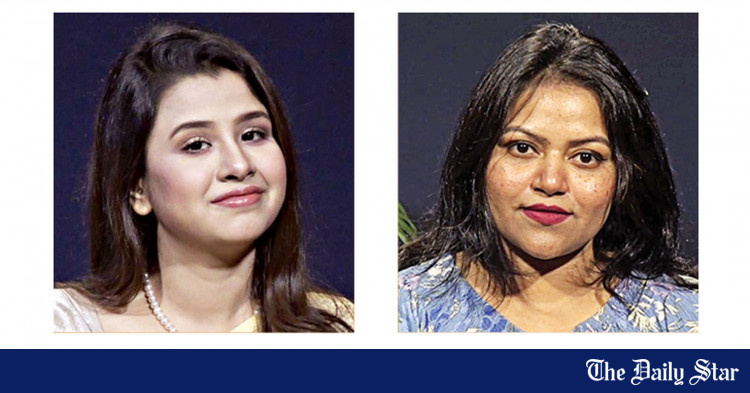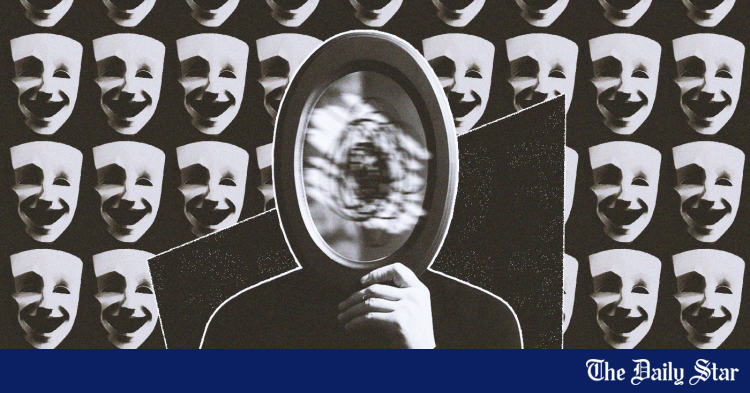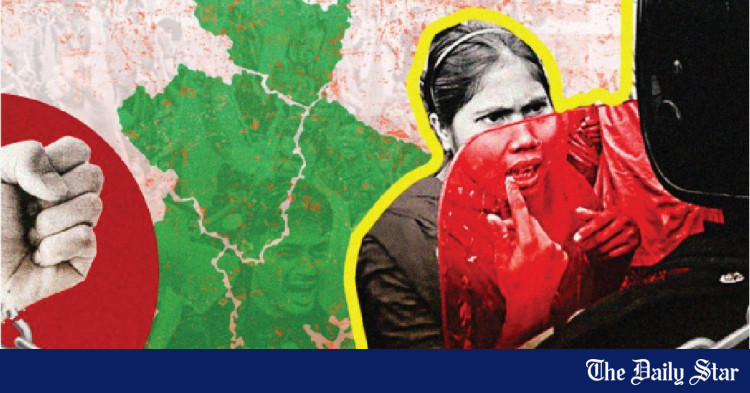Saif
Senior Member
- Joined
- Jan 24, 2024
- Messages
- 17,081
- Likes
- 8,163
- Nation

- Residence

- Axis Group


Rethinking nationalism in the wake of Bangladesh’s uprising
If the country is to rebuild itself, it must establish a national identity that unites its citizens and secures the future of the state.
Rethinking nationalism in the wake of Bangladesh’s uprising

In the wake of the 2024 uprising, the intellectual debate on nationalism will be crucial for shaping Bangladesh’s future. FILE PHOTO: PALASH KHAN
The 2024 student-public uprising in Bangladesh has reignited a critical conversation about the future of nationalism in the country. At the heart of this dialogue is the tension between Bangalee nationalism, born from the liberation movement of 1971, and Bangladeshi nationalism, which has been touted as an alternative. Mahfuj Alam, an important figure in the uprising, recently gave a speech that has gone viral, advocating for a shift towards a more inclusive and tolerant form of nationalism. His reflections raise important questions about the relationship between the state, society, and the individual.
Mahfuj's core argument revolves around the necessity of reforming the individual's moral character in order to reform society, which, in turn, would lead to the reform of the state. This bottom-up approach emphasises the role of personal ethics and social change as the foundations for state-building. His call for a shift away from Bangalee nationalism towards a more inclusive framework challenges the foundational ideas that have shaped Bangladesh's identity since its independence. However, this argument overlooks the complex interplay between the state and the individual and risks simplifying the path towards a more inclusive and tolerant nation.
At the crux of Mahfuj's speech is the idea that the state cannot achieve moral integrity unless its citizens first cultivate their own. This line of thinking, while partially valid, turns the relationship between the individual and the state into a one-way street. It places the burden of societal reform on the individual, ignoring the role the state itself plays in shaping the moral and ethical fabric of society. Institutions, laws, and policies are powerful tools that can influence and guide individual morality. In fact, they are often essential in protecting individuals from moral decline.
A more nuanced understanding of the relationship between the state and the individual would recognise it as a two-way process. The state has a responsibility to foster an environment where individuals can develop moral character, but individuals alone cannot bear the full burden of societal reform.
Mahfuj's vision of state-building through a bottom-up approach, where individuals and society must first be reformed before the state can be rebuilt, reflects a classical liberal view of the state. Yet, this approach can be slow and unwieldy, especially in moments of crisis like the present one. In contrast, top-down approaches, where the state takes the lead in reforming institutions and shaping societal norms, are often more effective in times of urgency. While bottom-up reform is necessary for long-term change, moments of national crisis demand swift, decisive action that only top-down approaches can deliver.
A key point in Mahfuj's argument is his call for a paradigm shift in nationalism, moving away from the secularism of 1971-based Bangalee nationalism towards a new, more inclusive form of nationalism. He critiques Bangalee nationalism as exclusionary, arguing that the rise of authoritarianism in Bangladesh has its roots in the secular framework established after 1971.
According to Mahfuj, the secularism that underpinned Bangalee nationalism failed to be inclusive, leading to the alienation of various social and religious groups, and, ultimately, contributing to the rise of authoritarianism. His vision is one of a secularism that embraces all ideologies and paths in the land, one that is more inclusive and reflective of the diversity within Bangladesh.
This critique of Bangalee nationalism is not without merit. The secularism that was central to the formation of Bangladesh in 1971 has indeed struggled to accommodate the full spectrum of identities within the country. However, Mahfuj's proposed solution—a complete break from Bangalee nationalism—raises its own set of questions. Is it truly necessary to abandon Bangalee nationalism altogether? Or can secularism be reinterpreted in a way that addresses its historical shortcomings while preserving the legacy of the liberation struggle?
The issue at hand may not be Bangalee nationalism itself but rather how its principles have been applied. If secularism were reimagined to include the diverse perspectives that Mahfuj envisions, it could serve as the basis for a reformed Bangalee nationalism that is capable of guiding Bangladesh through its current challenges. This would eliminate the need for a wholesale shift to a new nationalist paradigm, such as Bangladeshi nationalism, and would allow for a continuity of national identity rooted in the history of the 1971 struggle.
Mahfuj's call for a new nationalism, framed as a shift from Bangalee to Bangladeshi nationalism, also invites scrutiny. Can Bangladeshi nationalism, with its focus on a broader national identity, truly offer more inclusivity than a reformed Bangalee nationalism? And if it does, is that inclusivity inherent to Bangladeshi nationalism, or is it simply a matter of how secularism is applied within it? If the latter is true, then Bangladeshi nationalism may face the same application-based challenges as Bangalee nationalism has over the past five decades.
These debates are crucial as Bangladesh emerges from the 2024 uprising. The question of nationalism, and whether a paradigm shift is necessary, cannot remain unanswered for long. If the country is to rebuild itself, it must establish a national identity that unites its citizens and secures the future of the state.
The paradigm shift in nationalism that Mahfuj advocates may indeed be necessary, but only if it can offer a more inclusive, tolerant, and pragmatic path forward. Whether this shift comes through a reformed version of Bangalee nationalism or a move towards Bangladeshi nationalism remains to be seen. What is clear, however, is that any solution must address the deep-rooted issues of redemption, reconciliation, and inclusion that have haunted Bangladesh since 1971.
In the wake of the 2024 uprising, the intellectual debate on nationalism will be crucial for shaping Bangladesh's future. The state must address questions of identity and belonging to rebuild effectively. Beyond the immediate crisis, the focus should be on creating an inclusive and cohesive national identity. As Mahfuj rightly notes, the failures of redemption after 1971 must not be repeated. Moving forward, the state must reimagine its role in fostering an inclusive society that reflects the aspirations of all citizens.
Kazi ASM Nurul Huda is an associate professor of philosophy at the University of Dhaka and holds a PhD in philosophy from the University of Oklahoma, USA.
In the wake of the 2024 uprising, the intellectual debate on nationalism will be crucial for shaping Bangladesh’s future. FILE PHOTO: PALASH KHAN
The 2024 student-public uprising in Bangladesh has reignited a critical conversation about the future of nationalism in the country. At the heart of this dialogue is the tension between Bangalee nationalism, born from the liberation movement of 1971, and Bangladeshi nationalism, which has been touted as an alternative. Mahfuj Alam, an important figure in the uprising, recently gave a speech that has gone viral, advocating for a shift towards a more inclusive and tolerant form of nationalism. His reflections raise important questions about the relationship between the state, society, and the individual.
Mahfuj's core argument revolves around the necessity of reforming the individual's moral character in order to reform society, which, in turn, would lead to the reform of the state. This bottom-up approach emphasises the role of personal ethics and social change as the foundations for state-building. His call for a shift away from Bangalee nationalism towards a more inclusive framework challenges the foundational ideas that have shaped Bangladesh's identity since its independence. However, this argument overlooks the complex interplay between the state and the individual and risks simplifying the path towards a more inclusive and tolerant nation.
At the crux of Mahfuj's speech is the idea that the state cannot achieve moral integrity unless its citizens first cultivate their own. This line of thinking, while partially valid, turns the relationship between the individual and the state into a one-way street. It places the burden of societal reform on the individual, ignoring the role the state itself plays in shaping the moral and ethical fabric of society. Institutions, laws, and policies are powerful tools that can influence and guide individual morality. In fact, they are often essential in protecting individuals from moral decline.
A more nuanced understanding of the relationship between the state and the individual would recognise it as a two-way process. The state has a responsibility to foster an environment where individuals can develop moral character, but individuals alone cannot bear the full burden of societal reform.
Mahfuj's vision of state-building through a bottom-up approach, where individuals and society must first be reformed before the state can be rebuilt, reflects a classical liberal view of the state. Yet, this approach can be slow and unwieldy, especially in moments of crisis like the present one. In contrast, top-down approaches, where the state takes the lead in reforming institutions and shaping societal norms, are often more effective in times of urgency. While bottom-up reform is necessary for long-term change, moments of national crisis demand swift, decisive action that only top-down approaches can deliver.
A key point in Mahfuj's argument is his call for a paradigm shift in nationalism, moving away from the secularism of 1971-based Bangalee nationalism towards a new, more inclusive form of nationalism. He critiques Bangalee nationalism as exclusionary, arguing that the rise of authoritarianism in Bangladesh has its roots in the secular framework established after 1971.
According to Mahfuj, the secularism that underpinned Bangalee nationalism failed to be inclusive, leading to the alienation of various social and religious groups, and, ultimately, contributing to the rise of authoritarianism. His vision is one of a secularism that embraces all ideologies and paths in the land, one that is more inclusive and reflective of the diversity within Bangladesh.
This critique of Bangalee nationalism is not without merit. The secularism that was central to the formation of Bangladesh in 1971 has indeed struggled to accommodate the full spectrum of identities within the country. However, Mahfuj's proposed solution—a complete break from Bangalee nationalism—raises its own set of questions. Is it truly necessary to abandon Bangalee nationalism altogether? Or can secularism be reinterpreted in a way that addresses its historical shortcomings while preserving the legacy of the liberation struggle?
The issue at hand may not be Bangalee nationalism itself but rather how its principles have been applied. If secularism were reimagined to include the diverse perspectives that Mahfuj envisions, it could serve as the basis for a reformed Bangalee nationalism that is capable of guiding Bangladesh through its current challenges. This would eliminate the need for a wholesale shift to a new nationalist paradigm, such as Bangladeshi nationalism, and would allow for a continuity of national identity rooted in the history of the 1971 struggle.
Mahfuj's call for a new nationalism, framed as a shift from Bangalee to Bangladeshi nationalism, also invites scrutiny. Can Bangladeshi nationalism, with its focus on a broader national identity, truly offer more inclusivity than a reformed Bangalee nationalism? And if it does, is that inclusivity inherent to Bangladeshi nationalism, or is it simply a matter of how secularism is applied within it? If the latter is true, then Bangladeshi nationalism may face the same application-based challenges as Bangalee nationalism has over the past five decades.
These debates are crucial as Bangladesh emerges from the 2024 uprising. The question of nationalism, and whether a paradigm shift is necessary, cannot remain unanswered for long. If the country is to rebuild itself, it must establish a national identity that unites its citizens and secures the future of the state.
The paradigm shift in nationalism that Mahfuj advocates may indeed be necessary, but only if it can offer a more inclusive, tolerant, and pragmatic path forward. Whether this shift comes through a reformed version of Bangalee nationalism or a move towards Bangladeshi nationalism remains to be seen. What is clear, however, is that any solution must address the deep-rooted issues of redemption, reconciliation, and inclusion that have haunted Bangladesh since 1971.
In the wake of the 2024 uprising, the intellectual debate on nationalism will be crucial for shaping Bangladesh's future. The state must address questions of identity and belonging to rebuild effectively. Beyond the immediate crisis, the focus should be on creating an inclusive and cohesive national identity. As Mahfuj rightly notes, the failures of redemption after 1971 must not be repeated. Moving forward, the state must reimagine its role in fostering an inclusive society that reflects the aspirations of all citizens.
Kazi ASM Nurul Huda is an associate professor of philosophy at the University of Dhaka and holds a PhD in philosophy from the University of Oklahoma, USA.








































